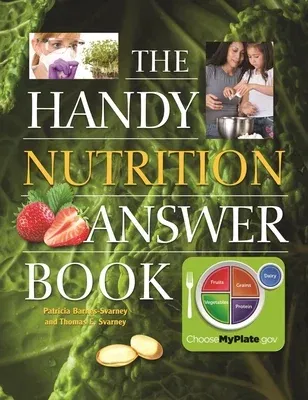You are what you eat ... and you should eat brilliantly! Your fitness,
health, and well-being depend on food and proper nutrition.
Yet, knowing what is in the foods we eat, understanding the differences
between good and bad fat, learning which foods are good sources of
vitamins, keeping up on the latest scientific discoveries, or discerning
the effectiveness of different diets can be challenging. To help answer
these questions there's The Handy Nutrition Answer Book.
Additionally, the book scrutinizes the pros, cons, and effectiveness of
the biggest, most popular, and trendiest diets on the market today. From
the newsworthy to the practical and from the medical to the historical,
this entertaining and informative book brings the complexity of food and
healthy nutrition into focus through the well-researched answers to
nearly 900 common questions, such as ...
How do our muscles obtain energy?
What is a calorie in terms of nutrition?
How are calories measured?
Why do vegetarians need to know about complementary proteins?
How does a person interpret how much fat to eat based on the daily
calories they want to consume?
What is omega-9?
How have trans fats in foods changed in the past--and how might they
change in the future?
Can dense carbohydrates that are high in fat and calories affect our
sleep?
What are some "healthier" natural sweeteners?
What recent study indicated that red wine and dark chocolate are not as
healthy as we think?
What are some of the worst ways to cook vegetables that destroy
nutrients?
What is the Maillard reaction?
What recent study showed how beer can help grilled foods?
How does human taste work?
Does the percent of water in our system change as we age?
What's the difference between gluten sensitivity, celiac disease, and
wheat intolerance?
What "sugar" can act like a laxative?
What did the ancient Roman soldiers eat?
Why did so many men die from starvation during the American Civil War?
What does the word "natural" mean on a label?
Why will food labels change in the near future?
What are genetically modified organisms (GMOs)?
Is there a controversy concerning farmed fish versus wild-caught fish?
What is irradiation of food?
Why is high fructose corn syrup so controversial?
How can diet help with premenopausal symptoms in women?
Can soy products lower my cholesterol?
Why do some people seem to eat whatever they want--and still lose or
maintain their weight?
This handy reference examines, explains, and traces the basics of
nutrition, the value of vitamins, minerals, fats, proteins, the science
behind food-processing, the modern food industry, nutritional
misconceptions throughout history, and so much more! It explains how to
read food labels, what to watch for in food additives, and it also
includes a helpful bibliography and an extensive index, adding to its
usefulness.

